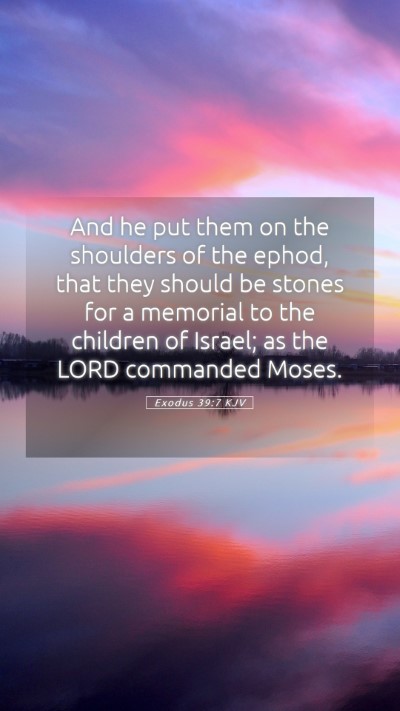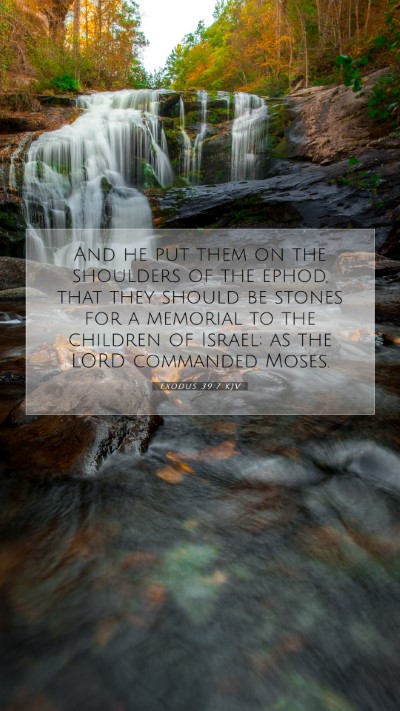Understanding Exodus 39:7
Exodus 39:7 states: "And he put them on the shoulders of the ephod, that they should be stones for a memorial to the children of Israel; as the Lord commanded Moses." This verse is a part of the detailed instructions concerning the priestly garments, specifically relating to the high priest's ephod and the significance of the stones.
Bible Verse Meanings
The meaning of this verse revolves around the significance of the stones placed on the high priest's ephod, symbolizing the twelve tribes of Israel. Matthew Henry suggests that the stones serve as a constant reminder before God of His covenant with His people. Albert Barnes adds that these stones exemplify the high priest’s role as an intercessor. Adam Clarke emphasizes the importance of memory and representation within the service of God, noting that the high priest bears the weight of the tribes on his shoulders, symbolizing the responsibility to care and intercede for them.
Bible Verse Interpretations
Interpretations of Exodus 39:7 highlight the ceremonial role of the high priest. The stones are emblematic of carrying the names of the tribes, representing God's people and their inheritance. The high priest acting on behalf of the people signifies the mediation that Christ represents according to Christian theology. This understanding resonates with the overall theme of atonement and intercession found throughout Scripture.
Bible Verse Commentary
In public domain commentaries:
- Matthew Henry: Emphasizes the stones as memorials before God, highlighting their function in worship and remembrance.
- Albert Barnes: Focuses on the symbolic weight of the stones, linking them to the high priest's responsibilities.
- Adam Clarke: Details the craftsmanship of the ephod and its theological implications, showcasing God's design for priestly garments.
Historical Context of Bible Verses
Understanding Scripture in its historical context is crucial for grasping its full meaning. The ephod, including its stones, was designed during the time of Moses for the Israelites as they wandered in the desert. This period was marked by establishing the tabernacle, priesthood, and rituals essential for worship. Each aspect, including the ephod, served to reinforce the identity and relationship of the Israelites with God.
Applying Bible Verses to Daily Life
When applying Exodus 39:7 to daily life, one can reflect on the importance of remembrance in the Christian faith. The high priest's bearing of the stones can serve as a metaphor for carrying burdens for others in prayer and intercession. Believers today are encouraged to act as mediators, advocating for the needs of their community before God, reminding themselves and others of God's promises and covenant.
In-Depth Bible Verse Analysis
An in-depth analysis reveals layers of meaning in this verse, including:
- Symbolism of the stones representing each tribe highlights the unity and diversity within the community of faith.
- Insights into the importance of leadership and responsibility in spiritual matters, embodied by the high priest.
- The role of memory in worship—constantly reminding the people of God's presence and promises.
Bible Study Insights
Bible study groups can benefit from discussing the implications of Exodus 39:7. When studying this verse, participants might explore:
- What it means to bear others' burdens in a spiritual community.
- The interpretation of priesthood in both Old and New Testament contexts.
- How remembrance plays a critical role in faith practices today.
Cross References
This verse has several related references, including:
- Exodus 28:9-12: Further details on the stones and their significance.
- 1 Peter 2:9: The concept of believers as a royal priesthood.
- Romans 15:1: Bearing the burdens of the weak within the Christian community.
Conclusion
In conclusion, Exodus 39:7 encapsulates profound meanings about leadership, responsibility, and the importance of reminding one another of God's promises. Through various commentaries, one finds rich insights into the role of the high priest and the collective identity of Israel as God’s chosen people. For anyone seeking a deeper Bible verse understanding, Bible verse explanations, or biblical exegesis, this verse offers a compelling entry point into the transformative nature of faith and community.


